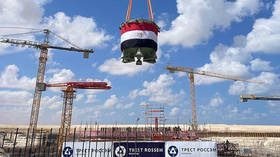Russian support key to African country’s first nuclear plant – official
An industry seminar in Cairo provided an opportunity for officials to discuss progress made on the El-Dabaa NPP
Construction of Egypt’s first nuclear power plant is proceeding smoothly thanks to support from Russia, the head of the Egyptian Nuclear Power Plants Authority, Amjad Al-Wakeel, said at an industry seminar on Thursday.
The event was organized jointly by the engineering division of the Russian state nuclear energy corporation Rosatom and the Authority for Nuclear Power Plants of Egypt (NPPA).
“The project of construction of El-Dabaa NPP is successfully developing due to political support and cooperation between Egypt and Russia in the light of the strategic objectives of both countries,” Al-Wakeel stressed.
“The use of nuclear energy for peaceful purposes plays a key role in achieving sustainable development goals and guarantees a confident future for future generations,” he added.
Alexey Kononenko, who is directing construction of the plant, called the project “an important step in the development of Egypt’s nuclear sector, which has opened up new opportunities for economic growth in that country.” He also noted that the project is proceeding quite quickly.
According to Kononenko, the seminar provided an opportunity to discuss a large number of issues related to localization processes, procurement, and equipment supply. He believes that this seminar will give Egyptian suppliers an “extra boost to participate in the El-Dabaa NPP construction project.”
More than 250 people attended the event, representing Russian and Egyptian companies.
El-Dabaa is Rosatom’s first major nuclear power project in Africa. The four-reactor facility is located about 300km northwest of Cairo, on the Mediterranean coast. The project was approved in 2015, launched in 2017, while construction got underway in 2022. Rosatom started building the third power unit in May 2023.
The cost of the nuclear power plant is $28.75 billion. As per a bilateral agreement signed in 2015, approximately 85% of it is financed by Russia and to be paid for by Egypt under a 22-year loan with an interest rate of 3%.
You can share this story on social media:








Comments are closed.